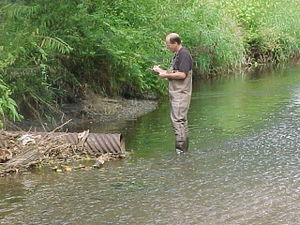
Difference between revisions of "MCM 6 Pollution Prevention/Good Housekeeping"
| Line 12: | Line 12: | ||
:#BMPs to protect Source Water Protection Areas, such as Drinking Water Supply Management Areas and source water protection areas for surface intakes. | :#BMPs to protect Source Water Protection Areas, such as Drinking Water Supply Management Areas and source water protection areas for surface intakes. | ||
:#Pond assessment procedures and schedule to evaluate the effectiveness of total suspended solids (TSS) and total phosphorus (TP) removal of municipally owned/operated ponds. | :#Pond assessment procedures and schedule to evaluate the effectiveness of total suspended solids (TSS) and total phosphorus (TP) removal of municipally owned/operated ponds. | ||
| − | :# | + | :#[[Municipal operation inspections]] which is inspections of structural stormwater BMPs annually, at least one inspection of ponds and outfalls during the permit term, and quarterly inspections of stockpiles and storage and material handling areas documented in the Facility Inventory. |
:#Maintenance of structural BMPs, outfalls, and ponds based on the results of the inspections detailed above. | :#Maintenance of structural BMPs, outfalls, and ponds based on the results of the inspections detailed above. | ||
:#[[Employee training]] as appropriate for the employee's position. Training should address the importance of protecting water quality and describe relevant [https://stormwater.pca.state.mn.us/index.php?title=MS4_General_Permit MS4 General Permit] requirements. The training should have a schedule that established initial training for new and seasonal employees and recurring training for existing employees. | :#[[Employee training]] as appropriate for the employee's position. Training should address the importance of protecting water quality and describe relevant [https://stormwater.pca.state.mn.us/index.php?title=MS4_General_Permit MS4 General Permit] requirements. The training should have a schedule that established initial training for new and seasonal employees and recurring training for existing employees. | ||
Revision as of 14:32, 8 January 2018
Contents
Introduction
It is generally easier and less expensive to prevent pollution at the source than restore a surface waters once they're polluted. Permitted municipal separate storm sewer system (MS4) communities are the first line of defense for many pollutants entering storm sewer systems within their jurisdiction, such as
- sand and salt for de-icing
- fertilizers and pesticides on municipal properties
- vehicle fueling and maintenance chemicals
Requirements
Minimum Control Measure (MCM) 6 in the MS4 General Permit requires permittees to maintain a operations and maintenance program to prevent or reduce pollutant discharges from municipally owned or operated properties. The program must include:
- A Facility Inventory that documents municipally owned/operated facilities that may pollute stormwater.
- Best management practices (BMPs) to prevent or reduce the stormwater impacts from the facilities documented on the Facility Inventory.
- BMPs to protect Source Water Protection Areas, such as Drinking Water Supply Management Areas and source water protection areas for surface intakes.
- Pond assessment procedures and schedule to evaluate the effectiveness of total suspended solids (TSS) and total phosphorus (TP) removal of municipally owned/operated ponds.
- Municipal operation inspections which is inspections of structural stormwater BMPs annually, at least one inspection of ponds and outfalls during the permit term, and quarterly inspections of stockpiles and storage and material handling areas documented in the Facility Inventory.
- Maintenance of structural BMPs, outfalls, and ponds based on the results of the inspections detailed above.
- Employee training as appropriate for the employee's position. Training should address the importance of protecting water quality and describe relevant MS4 General Permit requirements. The training should have a schedule that established initial training for new and seasonal employees and recurring training for existing employees.
- Documentation detailed here.
Resources
Fact sheets and guidance documents
- EPA MCM 6 guidance - EPA's guidance and suggested BMPs for an effective pollution prevention and good housekeeping for municipal operatations
- MPCA Pollution Prevention guidance - A Guide to utilize various pollution prevention methods to meet the requirements of the MS4 permit
- MPCA Managing Stormwater Sediment BMPs guidance - Guide for properly managing sediment from stormwater systems, such as ponds
- Coal Tar-based Sealcoat guidance - Guide to the use and concerns with coal tar-based sealcoats
- Swimming Poll and Hot Tub Water Discharge guidance - Guide for best managing pool and hot tub discharge
- Pollution prevention fact sheets - Fact sheets for properly managing pollution throughout the construction and post-construction process
Training videos
- Parks Maintenance and Stormwater Protection employee training video - Training video on how to perform park maintenance activities, such as lawn mowing, and leaf management, fertilizer use, erosion control, and watering practices, to minimize impacts to stormwater.
- Rain Garden Care employee training video- Training video on how to properly care for rain gardens or bioinfiltration systems to maximize their effectiveness and minimize impacts to stormwater.
Documentation and tracking templates
- File:FacilityInventory FINAL.xlsx - MPCA template provided to document your Facility Inventory
- Municipal Employee Training Tracking Template - MPCA template to document all required information related to employee training events
- Pond sediment excavation tracking template - MPCA template to document all required information related to pond sediment excavation activities at municipally owned or operated stormwater ponds.
- Documentation that MS4 staff should retain - List of all the documentation requirements (what information to keep, how long to keep it, level of detail to keep, etc.) for compliance with the MS4 permit
